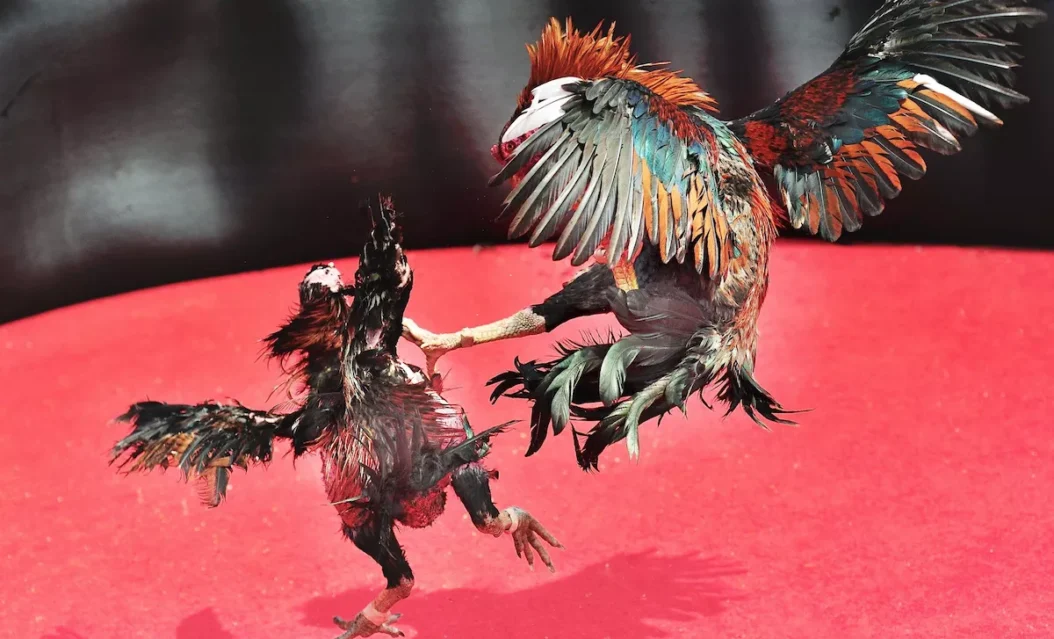Without a strong state anti-cockfighting law, or proper enforcement of the federal anti-fighting law, staged animal fights will continue in Hawaii and the cockfighters will continue to take their chances.
Honolulu, HI — Leaders of Animal Wellness Action and the Center for a Humane Economy reacted today to the latest cockfighting-related arrests in Hawaii — a state the groups have placed among the “Top 5 in the nation” for the prevalence of the animal-cruelty crime.
Five people were arrested over the weekend during what police say was a cockfight raid at a gathering on the Kaloli Drive end of the Hawaiian Paradise Park subdivision in Puna. The arrests were for suspicion of promotion of gambling and cruelty to animals. All were later released pending further investigation without being charged, police said. About 50 other individuals were at the event.

“At least this cockfight didn’t end in murder, as we’ve seen before, but it is absolutely no surprise that staged animal fights continue without abatement in Hawaii,” said Wayne Pacelle, president of Animal Wellness Action and the Center.
“The state legislature took a pass again this year on strengthening the law. How disappointing it must be for those cops to have their collars let out of custody without charges being filed.”
Pacelle was referring to the defeat of House Bill 1980, which would have elevated cockfighting from a misdemeanor to a class C felony. The measure died in its third reading in the state senate.
Not only is cockfighting an unnecessary bloodsport predicated on violence to animals, it brings along with it dangers to individuals, other animals, and even the U.S. economy.
Fighting animals smuggled into the United States threaten its commercial poultry industry. Ten of 15 outbreaks of virulent Newcastle Disease in the United States are directly tied to smuggled fighting roosters from Mexico, with just three outbreaks costing taxpayers $1 billion. Moreover, public health officials are increasingly worried about a zoonotic “spillover” of the disease from birds to other mammals, including humans, with potentially nightmarish consequences.
Commingled crimes should also spur officials and legislators to take action. Just last year, Honolulu Police booked and charged a 16-year-old suspect on multiple murder counts after a deadly cockfight in Maili that left two people dead and three others injured.
“Politicians have been cowardly in not addressing a malicious form of animal cruelty invariably bound up with other forms of lawlessness,” Pacelle said. “In light of what happened in Maili, it is a dereliction of duty that lawmakers chose not to fortify the state’s anemic anti-cockfighting law in the wake of a mass shooting at a regular and known cockfighting venue.”
Pacelle said that large-scale cockfighting events — often called “derbies” — frequently if not consistently mean that illegal drugs will be brought in for sale and that local hotel rooms will be occupied by “prostitutes, their pimps, and other malefactors in organized crime.”
Hawaii is one of only eight states where cockfighting is not a felony. The groups have placed it in the Top 5 states for cockfighting in the country, along with Oklahoma, Alabama, Kentucky, and California.
Reward Program
To help combat cockfighting, Animal Wellness Action has launched a new reward program that offers cash compensation not only for information that leads to arrests and convictions, but also for tips on the location of planned or occurring cockfights in Hawaii. The organization will provide $2,500 to any individual who provides tips to us or law enforcement that results in arrests for under state or federal law. Amounts for other information will vary based on the credibility and timeliness of the tips. Tipsters may email animalcrueltytips@animalwellnessaction.org.
A National Solution
Both the U.S. House of Representatives and U.S. Senate have issued the Fighting Inhumane Gambling and High-Risk Trafficking (FIGHT) Act, and the authors hope to include the provision as an amendment to the Farm bill. Both pieces of legislation were driven by concerns for the barbarism of animal fighting, other criminal behavior commingled with it, and disease threats to poultry posed by transporting fighting roosters. Senator Mazie Hirono is the only cosponsor of the FIGHT Act, among the four Members of the Hawaii Congressional delegation.
The FIGHT Act, amending Section 26 of the Animal Welfare Act, would enhance the enforcement opportunities by banning simulcasting and gambling of animal fighting ventures; halting the shipment of mature roosters (chickens only) shipped through the U.S. mail (it is already illegal to ship dogs through the mail); creating a citizen suit provision, after proper notice to federal authorities, to allow private right of action against illegal animal fighters; and enhancing forfeiture provisions to include real property for animal fighting crimes.

